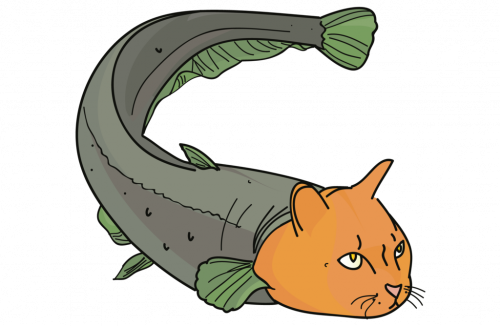The Merriam-Webster College Dictionary announced on Monday its addition of 150 new words. Many of these are technologically derived. Selfie, hashtag, tweep, and catfish (false identity—not the sea creature) are all included. Many media outlets reporting on this are interested in how new technologies continue to influence language through the addition of informal terms first utilized by teen populations.
However, many of the words are not, in fact, technologically rooted. There are additions in food (e.g., turducken), geography (e.g., ‘yoopers), the environment (e.g., cap and trade) etc. My question is less about why these particular words—technological and not— were added, but rather, why so late? I ate turducken my first Thanksgiving in grad school (before vegetarianism won me over), talked about cap and trade as an undergraduate, and have been ridiculed for referring to my Twitter network as “tweeps” for years. Where have you been, Merriam-Webster?
It turns out that some linguists—and the editors of mainstream dictionaries—are concerned about formalizing words without long shelf lives. They carefully vet words to make sure they have staying power. Asked by the Associated Press about possible tardiness with regards to “selfies”—especially in light of Oxford Dictionary naming it the 2013 word of the year—Merriam-Webster Editor Peter Sokolowski replied:
One of the most important things we have to watch is the trendiness of language, so we don’t want to put a word in that will then have to come out…We want to make sure a word is here to stay.
I argue that we need to re-think this logic. The logic of staying power and avoidance of trendiness made sense when 1) dictionaries were made out of paper and 2) trendy words were spoken instead of recorded. However, now that dictionaries are digital and trendy words are documented, I contend that we should cast as broad a definitional net as possible.
When dictionaries were made of paper, space was a finite commodity. Each new word took the physical space of another potential word, just as each page of the dictionary, or each volume, took potential space on a living room or office bookshelf. Once dictionaries were digitized, however, space ceased to be a scarce commodity. The inclusion of one word needn’t inhibit the inclusion of others. Bookshelves everywhere could sag a little less as curious consumers clicked links, Googled, highlighted, hovered, and right-clicked their way definitions. Spacially, then, there is no reason to worry that an included word will become outdated and fail to pull its weight.
The second point—that trendy words are now documented—is I think the more interesting logical shift. Trendy words used to be those informally spoken between friends and associates. The publication process was slow and the language of publication largely formal. This is no longer the case. Blogs, news articles, Youtube videos, Tweets, Facebook posts, e-books, text message archives etc., all document what people say and how they say it. These documents have potential staying power, and their language needs to be readable and interpretable by later generations. That the words themselves may be trendy is all the more reason to define them for posterity.
As later generations read the historical documents that we currently produce, it is likely that they will need help interpreting what the speakers and writers meant, where the terms came from, and how they were used. Rather than worry over the longevity of a word, let us hope that if a word does fall out of favor, a future reader can hover over it to find out what it used to mean.
Become one of Jenny’s Tweeps: @Jenny_L_Davis
Headline pic via: http://modrino.deviantart.com/art/Catfish-338006794


Comments 4
ArtSmart Consult — May 21, 2014
"The logic of staying power and avoidance of trendiness made sense when 1) dictionaries were made out of paper and 2) trendy words were spoken instead of recorded."
Absolutely agree! Very forward looking.
One question: should dying words be (a) kept on life support in a dictionary, or (b) allowed to die a natural death for evolution of language, allowing survival of the fittest words and the emergence of newer more useful meaning of outdated words?
Jenny Davis — May 23, 2014
Thanks for the comment. To your question, I think today, words should be preserved. The cost is low in terms of space and money, and the cost of not doing so is high. With informal discourse so heavily documented, formalizing vocabularies--especially temporary vocabularies--is an important interpretive tool
Ray Mims, Jr — May 31, 2014
Nothing wrong with printed dictionaries. I buy one every 5 years. Digital is wonderful, but what does one do when electricity/batteries go out?
New dictionary words as your research paper topic | Citations — July 21, 2014
[…] Davis, in “Merriam-Webster Adds New Words: What Took So Long?” posted on the Society Pages May 21, 2014, found that strategy outdated. “The logic of staying […]